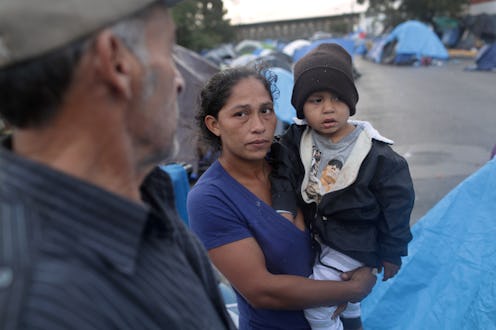News
How To Volunteer To Help Migrant Children If The Latest Reports Break Your Heart

One of the defining stories of 2018 has been the trying situation facing migrants arriving at the United States' southern border. Images of distraught children and parents have seared themselves into the minds of caring people all over the place, and you are certainly are not alone if you're wondering how to volunteer to help migrant children.
Currently, American authorities are holding approximately 15,000 migrant children in facilities scattered around the country, according to a report from the New York Times published shortly before Christmas. As the Guardian noted, more accurate records of the numbers of children in U.S. custody aren't available from the Department of Homeland Security, but various reporting throughout the year has shown that the number is on the rise. While DHS has maintained that the conditions in the federal detention centers offer "dignity and respect" to those detained, as the Guardian wrote, accounts from the migrants themselves have been far more troubling.
Donating money to organizations fighting to protect migrant children in U.S. custody is always an option. If your time and effort is what you have to offer, though, there are also several things you can do to help — and here are five of them.
1Work With The ACLU
Through its Immigrants' Rights Project, the ACLU is one of the biggest organizations fighting on behalf of immigrants arriving in the United States. One of the best parts about volunteering with the ACLU is that you can do it from basically anywhere in the country. All you have to do is find your local ACLU chapter and get in touch with the people there about volunteering. You can list out the issues you're interested in and what sort of expertise that you bring to the organization, and there's a good chance that they'll be able to set you up doing a job that you care about and that you'll be good at.
2Help A Child In Foster Care
While foster children are already by definition out of detention at the border, Slate explained that the foster care system is often an end result for children detained — and the system is already more taxed than it can effectively handle. To help, you can become a CASA volunteer, or a court-appointed special advocate for a child in the foster care system. This is a significant time commitment — you'll have to dedicate about 30 hours to training beforehand, and then you will be asked to commit to a single case until it's finished, which could take up to a year and half. During that time, you'll need to dedicate about 10 hours a week to your case — but you'll have such a significant effect in a child's life that the results will be incredibly gratifying.
3Become A Child Advocate
The Young Center for Immigrant Children's Rights, which is based in Chicago, has set up programs for people to become children's advocates in Chicago, Houston, San Antonio, Harlingen, Phoenix, Los Angeles, New York, or Washington D.C. As a children's advocate, you'd go through a screening process first, and then you would be able to make a difference in a child's life by hanging out with her and then advocating on her behalf when deportation proceedings come up.
4Share Your Legal Expertise
Lawyers, law students, and paralegals hoping to volunteer to help migrants are in great need, and if you fit that profile, then there are several organizations who would love to have your help. Among those are the Dilley Pro Bono Project, American Gateways, the Immigrant Justice Campaign, UnLocal, Kids in Need of Defense, and Human Rights First. While not everyone has a J.D., doing pro bono work for migrants in detention is great way of giving back if you do.
5Visit Kids In Detention
If you're located near one of the detention centers, you can volunteer with Freedom for Immigrants and actually have some human to human contact with the detained migrants. If you've got the means, you can also pledge through Freedom for Immigrants to host a migrant who would otherwise be detained. When you sign up to volunteer, the organization also offers other ways you can get involved, even if you're not located at the border.
It's difficult to read about the situation for migrants at the southern border, but there are numerous ways that you can spend your time working to make things better for them. No matter how much time you have to contribute, your efforts will make someone's life at least a little bit better.